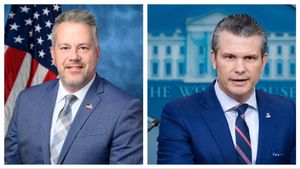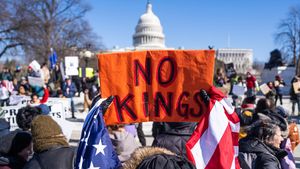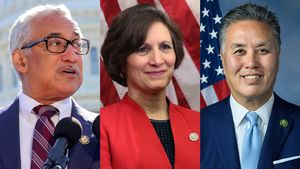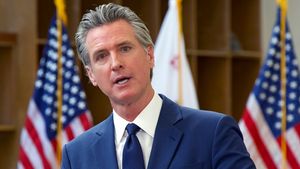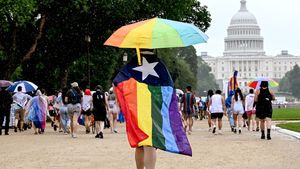Pornhub, Sniffies, and JustForFans, along with several other adult film platforms and dating/hookup websites, are facing new threats and/or restrictions from laws enacted by conservative politicians in 19 states (so far).
Sign up for the Out Newsletter to keep up with what's new in LGBTQ+ culture and entertainment — delivered three times a week straight (well…) to your inbox!
These new requirements and restrictions — which have already been enacted over the past two years — are now being enforced even more following Donald Trump's victory in the 2024 presidential elections. Not only are platforms like Pornhub, OnlyFans, and JustForFans very popular among people in the LGBTQ+ community, but these new laws are also putting at risk the income earned by queer and/or trans creators who make a living off of adult content.
What are the new restrictions to adult film platforms and hookup websites enacted by these state-level laws?
The following 19 states have already introduced similar restriction laws requiring users to go through new age-verification systems when accessing adult film websites, and hookup platforms like Sniffies are proactively responding to these new measures (via CNN):
Alabama
Arkansas
Florida
Georgia
Idaho
Indiana
Kansas
Kentucky
Louisiana
Mississippi
Montana
Nebraska
North Carolina
Oklahoma
South Carolina
Tennessee
Texas
Utah
Virginia
Even though Tennessee courts initially blocked a new restriction law in the state, AP News reports that a "panel of judges has ruled that Tennessee can begin enforcing" this new age-verification system for users on porn sites.
Why are platforms, creators, and consumers worried about these new restrictions?
The biggest concerns related to these age-verification systems include a user's right to privacy, a creator's freedom of speech, and a platform's ability to make money off of the services it provides (in a free market).
It is not illegal for people to use websites for dating and hooking up. Pornography, generally, is also not illegal. And yet, these new laws are reportedly impacting adult film websites as users turn to other less regulated platforms that aren't under the scrutiny of mainstream news.
How did Pornhub respond to these restriction laws?
CNN reports that Pornhub has responded to these new restriction laws by blocking access to its website in all but three of these states: Georgia, Louisiana, and Tennessee.
When reached for comment, a spokesperson for Aylo — the Canadian parent company that owns sites like Pornhub, YouPorn, Brazzers, and Men.com — shared a statement with Out reinforcing that its platforms have always supported the age verification of visitors. On the other hand, the company believes that "any law to this effect must preserve user safety and privacy, and must effectively protect children from accessing content intended for adults."
Aylo's statement, shared with Out, continues: "Unfortunately, the way many jurisdictions worldwide have chosen to implement age verification is ineffective, haphazard, and dangerous. Any regulations that require hundreds of thousands of adult sites to collect significant amounts of highly sensitive personal information is putting user safety in jeopardy. Moreover, as experience has demonstrated, unless properly enforced, users will simply access non-compliant sites or find other methods of evading these laws."
Aylo claims that this shift from users of popular websites (such as Pornhub) to smaller platforms "is not speculation," adding that the company has experienced the same result across the United States when attempting to comply with these new guidelines.
What impact did Pornhub experience after these laws took effect?
The Aylo spokesperson claims that Pornhub was one of the "few sites to comply with the new law" in Louisiana when it took effect on January 1, 2023.
"Since then, our traffic in Louisiana dropped approximately 80 percent," the statement shared with Out reads. "These people did not stop looking for porn. They just migrated to darker corners of the internet that don't ask users to verify age, that don't follow the law, that don't take user safety seriously, and that often don't even moderate content. In practice, the laws have just made the internet more dangerous for adults and children."
Aylo argues that the best solution to the issues outlined in these new restriction laws is "performing age verification at the source: on the device." The company highlights that most operating systems already have features like parental controls and content filters to prevent children from accessing content that parents consider damaging for them on modern-day computers, phones, tablets, and other devices — adding that these features can be tailored and customized for each specific family "without risking the disclosure of sensitive user data."
How did Sniffies respond to these restriction laws?
Sniffies, a hookup website that caters to queer men and focuses on importing the cruising experience into the digital era, has already issued a statement and enabled new features to comply with these restrictions put in place in several states — even though Sniffies is not a platform for adult films (like Pornhub is).
On January 2, Sniffies shared a statement announcing that it was "advancing trust and safety with enhanced ID-based age verification and comprehensive safeguards."
The Sniffies statement outlines a long list of changes and new features, including:
- Government ID Check: Users upload a government-issued photo ID, which is securely verified using an Optical Character Recognition (OCR) system to confirm the user's age.
- Face Liveness Check: A real-time facial verification ensures the person using the ID matches the individual accessing the platform.
- Blocklist Validation: IDs are cross-referenced against a secure blacklist of previously flagged fraudulent IDs, protecting the community while maintaining user anonymity.
A spokesperson for Sniffies claims that the company is "proud of the strong age-gating measures we've implemented over the years." With that said, the statement concludes with a sentiment similar to that expressed by the Aylo rep.
"Parents play a vital role in ensuring their children's safety online," the Sniffies spokesperson notes. "We urge them to leverage available tools and resources, such as whitelisting safe websites, configuring firewall settings, and using monitoring software to review internet usage. Equipping parents with this knowledge is key to preventing minors from accessing spaces intended exclusively for adults."
How did OnlyFans and JustForFans respond to these restriction laws?
In November 2024, following Trump's victory in the U.S. presidential election, Out reached out to platforms OnlyFans and JustForFans to ask what they expected from Trump's second turn in the White House.
Two months later, OnlyFans has yet to respond to Out's request for comment.
JustFor.Fans founder and CEO, Dominic Ford, quickly shared the following response with Out in the immediate aftermath of Trump's victory.
"There are no two ways about it: a second Trump administration puts our entire industry at risk. A younger, more naive version of me would say, 'There is no way they could actually ban porn — there is precedent in the Supreme Court about this.' But, as we have seen, the current court doesn't seem overly burdened by either precedent or modern norms. That Project 2025 targets, aggressively, porn and those who produce and distribute it, should scare us all. Even with the rich irony that Trump established his 'playboy' persona quite literally through Playboy magazine, and has been linked to several porn stars, we know the Republican Party has no shame, and is blazingly hypocritical."
Ford added: "JustFor.Fans has been on the front lines fighting this war for years now. We are named plaintiffs (along with the Free Speech Coalition) on many lawsuits against various states that have implemented ID Verification laws. These laws are meant to 'protect the children,' but are really just trying to shut the industry down. There are many better ways to protect children from adult content, and we all agree that our content should never fall into the hands of children. That's why there are website blockers and other technologies to allow parents to disable sites like ours on their children's devices. Industry websites, including JustFor.Fans, embed restricted-access HTML coding to alert these blockers that we are NOT child-friendly."
Ford highlighted that JustFor.Fans makes donations to the Free Speech Coalition, the Woodhull Freedom Foundation, and the Sex Workers Outreach Project, to name a few. Ford shared that JustFor.Fans has also helped fund transgender organizations like Trans Lifeline and Point of Pride.
"We are actively working to understand how best to mitigate these possible scenarios. One extreme would be moving the entire operation to another country," Ford wrote. "But on a nearer-term basis, we are bracing and ready to be part of any legal battles that arise. We have always made it a point to stand up and be counted, and to do our best to provide a safe space for our models. That call to arms is more important now than it has ever been."
Editor's note: A previous version of this story included Grindr, which has been removed upon further reporting.


































